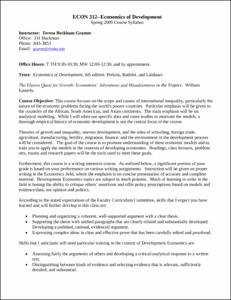Please use this identifier to cite or link to this item:
http://hdl.handle.net/10267/3421Full metadata record
| DC Field | Value | Language |
|---|---|---|
| dc.contributor.author | Gramm, Teresa B. | - |
| dc.date.accessioned | 2009-02-17T18:08:38Z | - |
| dc.date.available | 2009-02-17T18:08:38Z | - |
| dc.date.issued | 2009-01-14 | - |
| dc.identifier.uri | http://hdl.handle.net/10267/3421 | - |
| dc.description | This syllabus was submitted to the Rhodes College Office of Academic Affairs by the course instructor. | en_US |
| dc.description.abstract | This course focuses on the scope and causes of international inequality, particularly the nature of the economic problems facing the world's poorer countries. Particular emphasis will be given to the countries of the African, South American, and Asian continents. The main emphasis will be on analytical modeling. While I will often use specific data and cases studies to motivate the models, a thorough empirical history of economic development is not the central focus of the course. Theories of growth and inequality, uneven development, and the roles of schooling, foreign trade, agriculture, manufacturing, fertility, migration, finance, and the environment in the development process will be considered. The goal of the course is to promote understanding of these economic models and to train you to apply the models in the contexts of developing economies. Readings, class lectures, problem sets, exams and research papers will be the tools used to meet these goals. Furthermore, this course is a writing-intensive course. As outlined below, a significant portion of your grade is based on your performance on various writing assignments. Instruction will be given on proper writing in the Economics field, where the emphasis is on concise presentation of accurate and complete material. Development Economics topics are subject to much polemic. Much of learning to write in the field is honing the ability to critique others’ assertions and offer policy prescriptions based on models and evidence/data, not opinion and politics. According to the stated expectations of the Faculty Curriculum Committee, skills that I expect you have learned and will further develop in this class are: Planning and organizing a coherent, well-supported argument with a clear thesis. Supporting the thesis with unified paragraphs that are clearly related and substantially developed. Developing a polished, rational, evidenced argument. Expressing complex ideas in clear and effective prose that has been carefully edited and proofread. Skills that I anticipate will need particular training in the context of Development Economics are: Assessing fairly the arguments of others and developing a critical/analytical response to a written text. Distinguishing between kinds of evidence and selecting evidence that is relevant, sufficiently detailed, and substantial. Summarizing, extrapolating, and synthesizing material from a variety of sources, giving adequate and accurate documentation. Class time will be devoted to teaching the following topics related to writing the papers: Finding data Writing Economic history papers Writing analytical papers (applying models of Development Economics) Writing papers of policy prescriptions. | en_US |
| dc.language.iso | en_US | en_US |
| dc.publisher | Memphis, Tenn. : Rhodes College | en_US |
| dc.relation.ispartofseries | CRN Syllabi | - |
| dc.relation.ispartofseries | 29523 | - |
| dc.rights | Rhodes College owns the rights to the digital objects in this collection. Objects are made available for educational use only and may not be used for any non-educational or commercial purpose. Approved educational uses include private research and scholarship, teaching, and student projects. For additional information please contact archives@rhodes.edu. Fees may apply. | - |
| dc.subject | Syllabus | en_US |
| dc.subject | Curriculum | en_US |
| dc.subject | Economics, Department of | en_US |
| dc.subject | Academic departments | en_US |
| dc.subject | Text | en_US |
| dc.subject | 2009 Spring | en_US |
| dc.title | ECON 312-01, Economics of Development, Spring 2009 | en_US |
| dc.type | Syllabus | en_US |
| Appears in Collections: | Course Syllabi | |
Files in This Item:
| File | Description | Size | Format | |
|---|---|---|---|---|
| 2009_spring_Economics_312-01_29523.pdf | 275.49 kB | Adobe PDF |  View/Open |
Items in DSpace are protected by copyright, with all rights reserved, unless otherwise indicated.